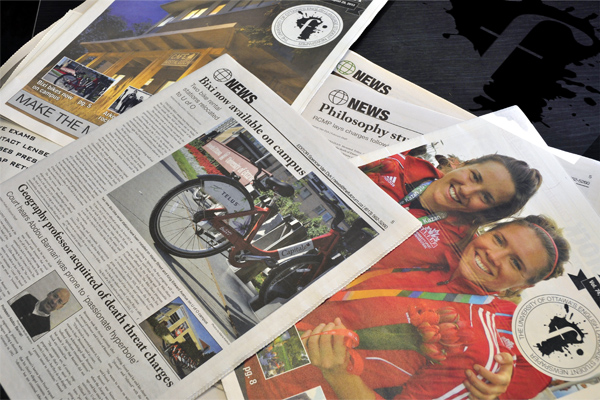Referendum brings attention to racial issues on campus
A Racialized Student Centre could become the Student Federation of the University of Ottawa’s (SFUO) 13th service—and the second new one this year—pending the result of a referendum during the SFUO general election.
The referendum question asks students whether they are in favour of paying $1 per semester for full-time students, and 50 cents for part-time students, in order to create and run the centre.
“We need one because there are issues that racialized students face on this campus, because they are racialized and at this point there’s not really a place for them to go,” said Naomi Martey, who’s leading the “yes” committee for the referendum.
“It would be like a peer-to-peer support space,” said Martey, citing resources such as medical and legal services tailored to address racial issues, events, and the availability of a drop-in space.
The shooting death of American teenager Michael Brown in Ferguson, Mo. and other highly publicized shootings of black youth at the hands of white police officers in the past year has put a spotlight on modern day racism, and was a catalyst for Martey’s campaign.
She said she couldn’t book a space on campus to host a vigil for Brown because she was an individual student, not a student group. This led her to submit a motion to the November general assembly to hold the referendum.
“Racialized students needed a place to have that same power and that same leverage on campus,” she said.
Students weren’t able to vote on the motion because the GA didn’t meet quorum, so it was tabled to the December Board of Administration meeting, where the members voted overwhelmingly in favour to hold the referendum.
The referendum does not have an official “no” committee, though it’s not without opposition.
Josh Giesbrecht, a fourth-year political science and public administration student, opposes the creation of the centre, citing worries that such a service would be divisive.
“Having centres on our campus that celebrate and promote different cultures and languages is great. From what I have read and know of the Racialized Student Centre, I don’t see the same positive sentiment,” said Giesbrecht, noting last spring’s In My Skin campaign caused controversy over its separation of whites and non-whites.
“Basically I saw it as drawing racial lines between students, trying to split people up based on skin colour alone,” he said.
Giesbrecht said SFUO services like the International House and the Student Rights Centre already address race issues.
Martey said existing SFUO services aren’t equipped with the necessary resources to deal with racism and discrimination on campus, and clubs on campus that do deal with racial issues don’t have adequate financial resources and personnel.
Vice-president of Equity Maya McDonald said she’s glad that discussions about race are happening on campus. “I definitely agree that we need spaces for racialized students. I don’t think that is exclusive to a service centre, but it is a viable option,” she wrote in an email.
McDonald said she can personally attest to how pervasive racism is on campus. “I have had interactions with faculty members and other students who are ‘surprised’ or ‘impressed’ by the vocabulary I use,” said McDonald. “This time last year, I had people tell me that the only reason I’m on the SFUO executive now is because I’m black.”
SFUO president Anne-Marie Roy said she was in favour of the new centre.
“I’ve heard a lot of students’ stories that, unfortunately, definitely reflect there’s still discrimination and racism on our campus,” she said.
Roy said she has already informed the University Centre management board about the potential new service, with her eye on a third-floor space.
The SFUO general election will be held Feb. 10–12.
—With files from Lindsay MacMillan





